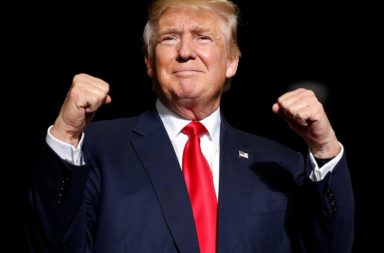Enjoying its best image in Latin American countries after decades of interventions, indirect interference on internal issues and economic blockades, the United States faces a big regional threat under an eventual presidency of Donald Trump. According to a pool from Latinobarometro, the country currently holds an overall positive image across Latin America, with 65% of the interviewees having a “good” or “very good” impression of the US – majorly a result of regional policies under the Obama administration. Mr. Trump´s harsh approach over “Latinos” and migrants, whom he blamed to steal American jobs, rape women and haul drugs across the border presents a threat to the US image in Latin American countries and forecasts a lot that is yet to come to the region if he wins.
Among many controversial statements made over the race for the Republican nomination, which will likely be granted to him at the convention, Mr. Trump picked a fight especially with Mexicans, proposing the construction of a wall that would avoid “bad migrants” coming into America and bringing their problems with them. As an immediate consequence, several demonstrations across South and Central America took place against Mr. Trump’s controversial and racist positions. Also, petitions circulated to persuade big Latin-American companies to cease economic ties with Mr. Trump’s businesses. Miss Costa Rica chose to withdraw from the Miss Universe contest – a contest organized by Mr. Trump´s companies – in response to the candidate’s xenophobic positions towards the Latino community.
Trump hoping that eating Tacos would make things better with the Latino voters.
More recently, Mr. Trump questioned the U.S. District Judge Gonzalo Curiel’s ability to be impartial in cases judged by him against the Trump University real-estate program given his Mexican heritage. “It is unfortunate that my comments have been misconstrued as a categorical attack against people of Mexican heritage,” Mr. Trump objected. “I am friends with and employ thousands of people of Mexican and Hispanic descent.”
Mexican Response
Not considering the actual feasibility of building a wall between both countries, the very fact of stating this willingness created a diplomatic tension with the neighbor country. Mr. Trump’s racist posture towards the US third largest commercial partner granted him the nickname “the Clown” among Mexicans. Breaking the diplomatic protocol, the Mexican President Mr. Peña Nieto labeled Trump as “strident” and compared his rise to that of Hitler and Mussolini.
These tensions generated an intense communications campaign to strengthen Mexican-US relations. In this context, advocacy groups started pressuring Mexicans with permanent residency in the US to register to vote in the US elections against Trump. Mexican Consulates throughout the country are even promoting US citizenship workshops to help in this process.
Anti-American feelings are here again?
Over the last decade, the so called “anti-americanism” remained strong and alive only in some very populist regimes such as the Venezuelan government under Hugo Chavez and Nicolas Maduro. Even with some setbacks after the espionage scandals that the NSA had been investigating President Dilma Rousseff in Brazil in 2013, the image of the United States remained overall positive in Latin America. By fixing a long lasting dispute with Cuba, said to be the last bridge to end the Cold War disputes, the Obama administration overcame the economic embargo and paid a historic visit to the island.
With changes in governments in Argentina and Brazil, the Obama administration paved the way for an increase in the US-Latin American relation that could strengthen the ties among the Americas in an opportunity that may take a long time to repeat. With Mr. Trump, a feeling of anti-Americanism can be again on the agenda of these countries, harming economic and commercial ties in the region and bringing old diplomatic tensions back to the agenda.
A “Godzilla” of the world politics
According to Ernersto Samper, a former Colombian president (1994-1998) and currently secretary-general of the UNASUR – a regional organization comprised by twelve South American countries -, the bloc fears a possible victory of Mr. Trump on the general elections. He compared Trump to a Godzilla after he got rid of his contenders on the primaries in a campaign based on insults to women, Mexicans and Muslims. According to Mr. Samper, the consequences of Mr. Trump winning the presidency would not only be terrific for the region, but for the whole world.
“It would be like the arrival of Godzila to world politics, it represents all the “Ugly American” chapters, it would be like going back to the past.” said the former Colombian president, now ahead of the UNASUR.
America for the Americans
Mr. Trump recently stated that he would be willing to change the rules to acquire the US citizenship from a Jus soli rule (‘right of the soil’), under which anyone born in the territory of a state are entitled to have the citizenship, to a Jus sanguinis (right of blood), where citizenship is determined by having one or both parents who are citizens of the state. He also stated the intention of expelling around 11 million illegal immigrants, the majority of them with “Latino” origins.
The Trump campaign has been characterized by a strong populist bias, well known in many Latin American countries. By placing the blame on the people´s troubles on the others, Trump builds a nationalist approach that fits well with many voters fed up with the same politicians and the same political parties. He capitalizes his candidacy in a moment when the image of the American institutions – government, Supreme Court and Congress – are experiencing their lower levels of confidence. Although being somewhat a global trend, a populist messiah is not the way to solve America´s troubles. On the contrary, it can be the beginning of many others.
What is on the agenda?
Among prejudicial and populist remarks, Mr. Trump signals that the agenda with Latin America will likely be focused on topics related to immigration, fight against drugs and commercial relations. As a result in those different areas, the region could face a less connected, more protectionist and less amicable approach coming from the US. Mr. Trump repeatedly states that many countries take advantage of the US in commercial and diplomatic relations – many of which in Latin America. Building ties between the US and the region has always been a sensible matter after decades of interventions and wars in Latin America. With Trump, cooperation and friendly relations would probably remain low on the US regional policy´s priorities, and old tensions would certainly come back to the agenda on the region.





